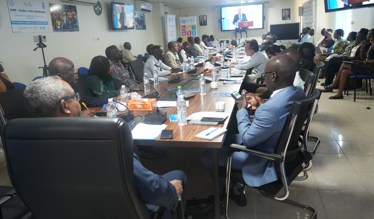The UN Country Team, in partnership with the South Sudan Ministry of Environment, hosted a climate watch party and a climate action discussion where youth, civil society organizations, and UNDP South Sudan youth ambassadors reflected on UN Secretary-General António Guterres’ powerful “Moment of Opportunity” speech.
The speech, delivered on Tuesday, called for increased investment in green energy, achieving 100% renewable energy by 2030 for data centers, and a just, inclusive transition that supports developing nations. It also highlighted the importance of seizing economic opportunities through bold Nationally Determined Contributions (NDCs) ahead of the upcoming COP30.
In his speech, SG Guterres emphasized that renewable energy is now cheaper and faster to deploy than fossil fuels and that in 2024, 92.5% of all new electricity capacity came from solar and wind. He also declared the fossil fuel era is ending and called for a halt to all fossil fuel subsidies, which still amount to $7 trillion globally. He urged countries to tax windfall profits from oil and gas companies and reinvest in renewables.
Guterres said tech companies must commit to 100% renewable-powered data centers by 2030 and that with AI’s energy demands growing, tech firms must be climate leaders—not climate polluters. He also urged governments to submit new national climate plans by September 2025 and banks and investors to stop funding fossil fuels and scale up finance for renewables.
Speaking at the event, Dr. Mohamed Abchir, UNDP Resident Representative, said Guterres’ speech is a call to action to reset the global narrative around climate change, seeing it not only as a threat but also as an opportunity for sustainable development, green jobs, innovation, and inclusive growth.
“In South Sudan, climate change is a daily reality; recurring floods, droughts, and environmental degradation continue to disrupt lives, especially for vulnerable groups, while also compounding access and logistical challenges in delivering humanitarian aid,” he said. “But we also know that climate action is development action. With the right policies, partnerships, and investments, South Sudan can chart a path that is not only resilient but also inclusive and green.”
“The United Nations is well aligned with South Sudan’s priorities at both the global and national levels, including the doubling of the Adaptation Fund, raising the Loss and Damage Fund, urging developed countries to reduce emissions by 40%, increasing ambition toward attaining the New Collective Quantified Goal (NCQG) of $1.5 billion, building resilience, reducing over-dependence on traditional biomass energy sources (fuel and charcoal), and accelerating adaptation efforts to address the impacts of climate change,” Dr. Abchir added.
For his part, Joseph Africano Bartel, Undersecretary, Ministry of Environment and Forestry, said South Sudan stands at a crossroads, facing climate change, which is one of the most pressing challenges of recent times.
“In South Sudan, the impacts of this global crisis are not just distant concerns; they are a reality we confront daily. With negligible emissions, South Sudan is grappling with the impacts of climate change such as flooding, droughts, heatwaves, sandstorms, etc.,” he said. “Floods have devastated our communities, displaced thousands, and destroyed livelihoods. Droughts have left our people without food and water. Climate change is not just an environmental issue; it is a humanitarian crisis that affects our health, livelihoods, and future.”
He said South Sudan is one of the most vulnerable countries in the world, with many of its citizens depending on agriculture and natural resources for their survival.
“As climate patterns shift, we must recognize that our farmers, herders, and fishermen are on the front lines of this battle. We must listen to their voices and understand their struggles,” he stated. “To adapt and mitigate these impacts and South Sudan has developed an ambitious NDCs, NAPA, and NAP. The implementation of these documents is conditional on the provision of adequate climate finance.”
Meanwhile, Michael Julius, a passionate climate change advocate, meteorology student at the University of Juba, and a UNDP South Sudan Student Ambassador, said SG Guterres’ decision to convene such a high-level international climate-action event is timely and a very promising step toward collective climate action.
“This shows a clear commitment by raising an urgent alarm on climate change—a crisis that has affected the world for some time, but in my case, has ravaged my homeland,” he said. “For a nation scarred by conflict and poverty, climate change has not only further fueled the chaos, it is also threatening our existence and survival.”
“So today, I plead for a global action to secure South Sudan’s future through adaptation and climate financing,” Julius added.




